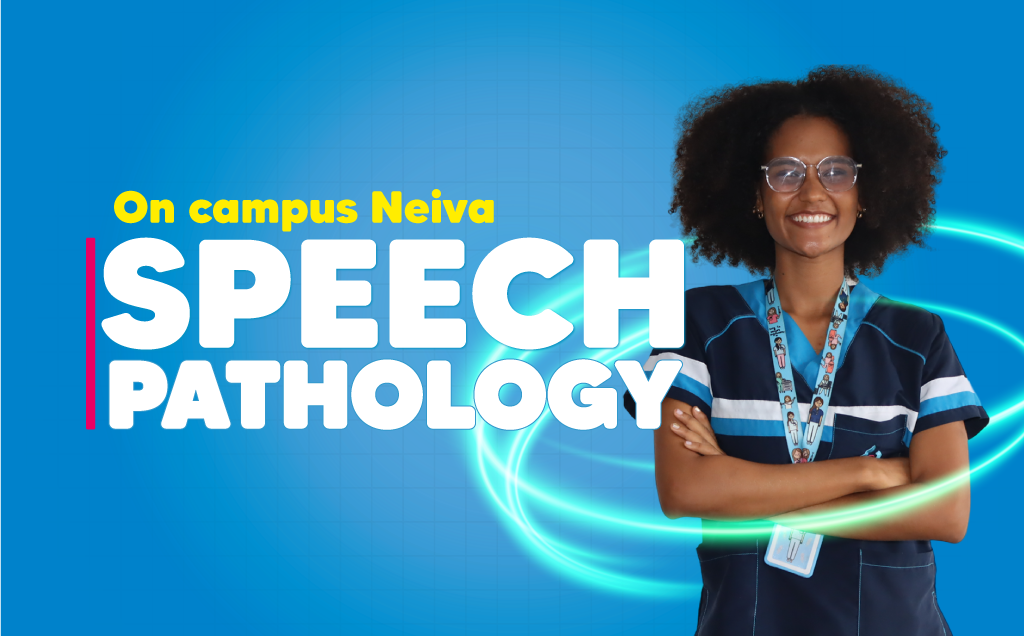Pregrado Fonoaudiologia Neiva
What is Speech Pathology?
Speech-language Pathology and Audiology is a health profession that deals with human communication, its disorders and variations. This communication is manifested in the person’s ability to relate with others through skills in speaking, listening, reading and writing. However, these skills may get to be diminished or altered by biological causes, psychological or social issues affecting the well-being and the quality of life of each person, triggering communication disorders.
In this sense, a phonoaudiologist plays a professional role in the health area, as well as in educational and social welfare. Diagnoses communicative actions are performed in terms of the population needs, such as evaluating, identifying, and intervening the disorders and alterations of the communication in a timely and efficient manner. It is also the interest of Speech-Language Pathology and Audiology, the communication for the hearing impaired, and therefore recognizes that this community presents a variation in its communication and thus requires Phono audiological support in order to ensure their communicative well-being.
SNIES 109553
RC N. 020544 del 28 de octubre de 2020
Vigencia: 7 años
Duración: 9 semestres
Número de créditos del programa: 160
Periodicidad de admisión: Semestral
Modalidad: Presencial
Título que otorga: Fonoaudiólogo
Value 2026: $5,574,849 per semester
Professional profile:
The Speech Pathologist at the María Cano University Foundation is a professional with critical thinking, problem-solving skills, social commitment and glocal vision, entrepreneurs and innovators, who focus their actions on communicative well-being, recognizing both the individual variables and those of the environment that influence this. He has extensive knowledge of human communication, its alterations and variations, from the psychobiological areas of language, hearing, speech, voice and oral-pharyngeal function, and its approach through the professional domains of:
• Promotion of communicative health
• Prevention of communication disorders
• Evaluation and diagnosis of communicative health conditions
• Integral rehabilitation
• Follow-up and monitoring of communicative health programs and their determinants
• Research, entrepreneurship and innovation
The above, seeking to contribute to the development and transformation of people, communities and organizations, from the identification and addressing of their communication needs.
Occupational profile
Phono audiologists perform in the sectors of health, education, industry and social welfare, developing welfare activities (assessment, determination of communicative diagnostics and therapeutic intervention), promotion, prevention, counseling, administration, research and consulting. In the same manner, It is also possible to exercise through teaching in higher education programs related to such area at formal or non-formal level.
Admission Requirements Undergraduate Programs
Admission requirements New In-person and Virtual Undergraduate Applicant
To enter any of the undergraduate programs offered by María Cano, the new applicant must complete the following procedure:
Fill out the online registration form
Make the payment of undergraduate registration fees $141.144
At the end of the registration form, upload to the platform the following documents one by one (in PDF format) as indicated at the end:
Photocopy of the high school degree certificate or diploma, if you have not yet completed grade 11, original study certificate, issued by the school valid for no more than one month.
Results of the ICFES tests (Saber 11), if you do not have the results you can attach the citation to the test.
A legible photocopy of the identity document (enlarged).
A 3×4 size photo, light blue background.
Documents are not received physically unless required during the admission process.
Print the registration payment form at the end of online registration or make payment through PSE.
*The Foundation reserves the right to admit and assign study schedules to students.
Curriculum
Study plan
Semesters
Créditos
| Mathematical logic | 2 |
| Morphophysiology I | 3 |
| Human development | 2 |
| Chair Maria Cano | 2 |
| Communication techniques | 2 |
| Epistemology | 2 |
| Introduction to health | 2 |
| Introduction speech therapy | 2 |
| TOTAL | 17 |
Créditos 17
Créditos
| Computing | 2 |
| Management environmental | 2 |
| Morphophysiology II | 4 |
| Biochemistry | 3 |
| Research methodology I | 2 |
| Ethics | 2 |
| Communication theories | 2 |
| TOTAL | 17 |
Créditos 17
Créditos
| Research methodology II | 2 |
| Projects formulation | 3 |
| Disability | 2 |
| Neurophysiology | 4 |
| Linguistic Fundamentals I | 3 |
| Speech and hearing anatomy | 3 |
| Elective | 1 |
| TOTAL | 18 |
Créditos 18
Créditos
| Statistics | 3 |
| Project evaluation | 3 |
| Psychopathology | 2 |
| Linguistic Fundamentals II | 3 |
| Audiology I | 4 |
| Speech Assessment and Intervention | 4 |
| TOTAL | 19 |
Créditos 19
Créditos
| Language development and stimulation | 4 |
| Literacy language process | 3 |
| Audiology II | 4 |
| Voice assessment and intervention | 4 |
| Public health | 4 |
| TOTAL | 19 |
Créditos 19
Créditos
| Epidemiology | 2 |
| Oral and pharyngeal function | 2 |
| Child Language Assessment and Intervention | 3 |
| Assessment in literacy intervention | 3 |
| Community processes practice I | 4 |
| Occupational Health and Phonoaudiology | 3 |
| Communication of the deaf | 3 |
| TOTAL | 20 |
Créditos 20
Créditos
-
Adult language assessment and intervention 4 Health Services Administration 2 Assessment and intervention myofunctional 2 Practice II 10 TOTAL 18
Créditos 18
Créditos
| Entrepreneurship I | 2 |
| Program elective | 2 |
| Professional affairs | 2 |
| Practice III | 10 |
| TOTAL | 16 |
Créditos 16
Créditos
| Entrepreneurship II | 2 |
| Practice IV | 10 |
| Deepening line | 4 |
| TOTAL | 16 |
| TOTAL PROGRAM CREDITS | 160 |
Créditos 16
Note: María Cano’s undergraduate and graduate academic programs may include classes on Saturdays.

